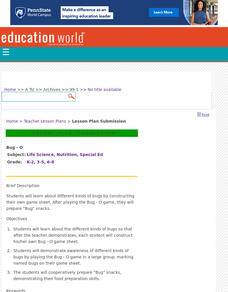Curated OER
Vermicomposting
First graders investigate composting. In this biology lesson, 1st graders identify ways to use garbage as fertilizer. Students examine soil and compost matter as well as the role of worms in the dirt.
Curated OER
What Plants Need in Order to Survive and Grow: Light
Students conduct an experiment to evaluate whether plants need light to survive and grow. They observe and gather data about plant responses to different growth regimes, analyze the data, and make conclusions about basic plant needs.
Curated OER
Fable of the Fainting Goat
Second graders explore animal life by reading children stories in class. In this goat fable lesson, 2nd graders read several books which describe the different myths and folklore about goats. Students identify the needs of living animals...
Curated OER
My Little Seed House
Second graders explore plant life by participating in a germination activity. For this botany lesson, 2nd graders read several books about seed germination including Sunflower House and Tiny Seed. Students identify the necessary elements...
Curated OER
Sunlight and Warm Air
Students examine the different ways heat can be felt. In this radiation and conduction lesson, students recognize that the sun radiates heat. Students conduct three experiments to find how the sun warms the Earth and how that heat...
Curated OER
Making Healthy Eating Choices for You and Others
Learners use the USDA food guide pyramid to choose items for a balanced diet. In this food pyramid lesson, students play a game naming the items and their foo groups. Learners participate in cross curricular activities...
Curated OER
ESOL Health and Nurtition
Students brainstorm a list of vocabulary necessary to request a doctor's appointment and the importance of having and keeping an appointment to see a doctor. They work with partners and role play patient requesting an appointment...
Curated OER
Nutrient Comic Strip
Pupils design a comic strip with a purpose of explaining what a specific nutrient does and how it functions in our body. They choose one of six nutrients and incorporate the research into a creative comic.
Curated OER
Bug-O
Middle school special education students (moderate to severe) learn about insects by playing an entomological version of bingo. They cut out pictures of different bugs and glue them onto a grid. Place the game card inside a sheet...
Curated OER
World Hunger
Students research the causes and effects of world hunger on children. In this world hunger lesson, students discuss causes and effects of hunger around the world and research a specific area affected by hunger. Students prepare a...
Curated OER
What Is Hunger and Who are the Hungry?
Students investigate the purpose of food and how the body needs it for survival. The social problem of hunger is introduced and then researched looking for its causes and some solutions. There is background information in the lesson for...
Curated OER
Health Fair
Young scholars identify and research the aspects of a healthy lifestyle and create a Health Fair with the information. In this healthy living lesson, students research a topic about healthy living. Young scholars then create a health...
Curated OER
Thanksgiving Feast (Read the Charts)
Students practice reading charts about foods country of origin. They interpret information and answer questions related to charts. They discover how food production adds to the economy.
Curated OER
Identifying Implications
Learners read a variety of reading passages and articles. They investigate how to make implications and assumptions using the information provided.
Curated OER
Learning From Leaves: A Look at Leaf Size
Students measure and analyze leaves from various environments. They discuss the environments, and make inferences about environmental variables that could have contributed to the differences in leaf size and texture.
Curated OER
The Dentist
Students read a short story about visiting a dentist. Then they use toothbrushes in order to demonstrate the correct way to brush teeth. Students use the internet to investigate how some foods are healthier for teeth than others. Then...
Curated OER
Food Challenge
Students identify poor eating habits and create a plan to overcome them. In this eating habits lesson plan, students identify four eating habits they have and research the implications of poor eating habits. Students find healthy...
Curated OER
Little Red Hen
First graders explore biology by identifying plant anatomy in class. In this botany lesson, 1st graders read the book The Little Red Hen and identify the methods used in order to grow successful plants. Students discuss other ways people...
Curated OER
Where Do Your Veggies Grow?
First graders investigate the origins of vegetables. In this Science activity, 1st graders identify where fruits and vegetables come from. Students describe how people utilize plants.
Curated OER
Algae Experiments
Students describe the characteristics of algae. In this biology lesson plan, students perform a series of experiment to explore algae. They investigate the basic things algae need to survive.
Curated OER
Ecology and the Conservation of Natural Resources Lesson 2
Students compare and contrast abiotic and biotic factors. They discuss how these factors effect ecosystems. They answer questions to complete the lesson.
Curated OER
Animals and Environments
Students listen to stories and identify animals and their young. In this animals lesson, students view videos about farm animals and create illustrations to show how animal babies change over time. Students discuss...
Curated OER
Exploring Texture In the Garden
Students explore the garden environment. In this garden environment lesson, students investigate the needs and parts of a plant. Students discover the differences between fruits and vegetables while creating their own garden.
Curated OER
Who's Who?
Students explore biology by identifying animals and their environments. In this animal characteristic lesson, students read assigned text about farm animals, how they are raised, and what they are used for in our society. Students view a...

























